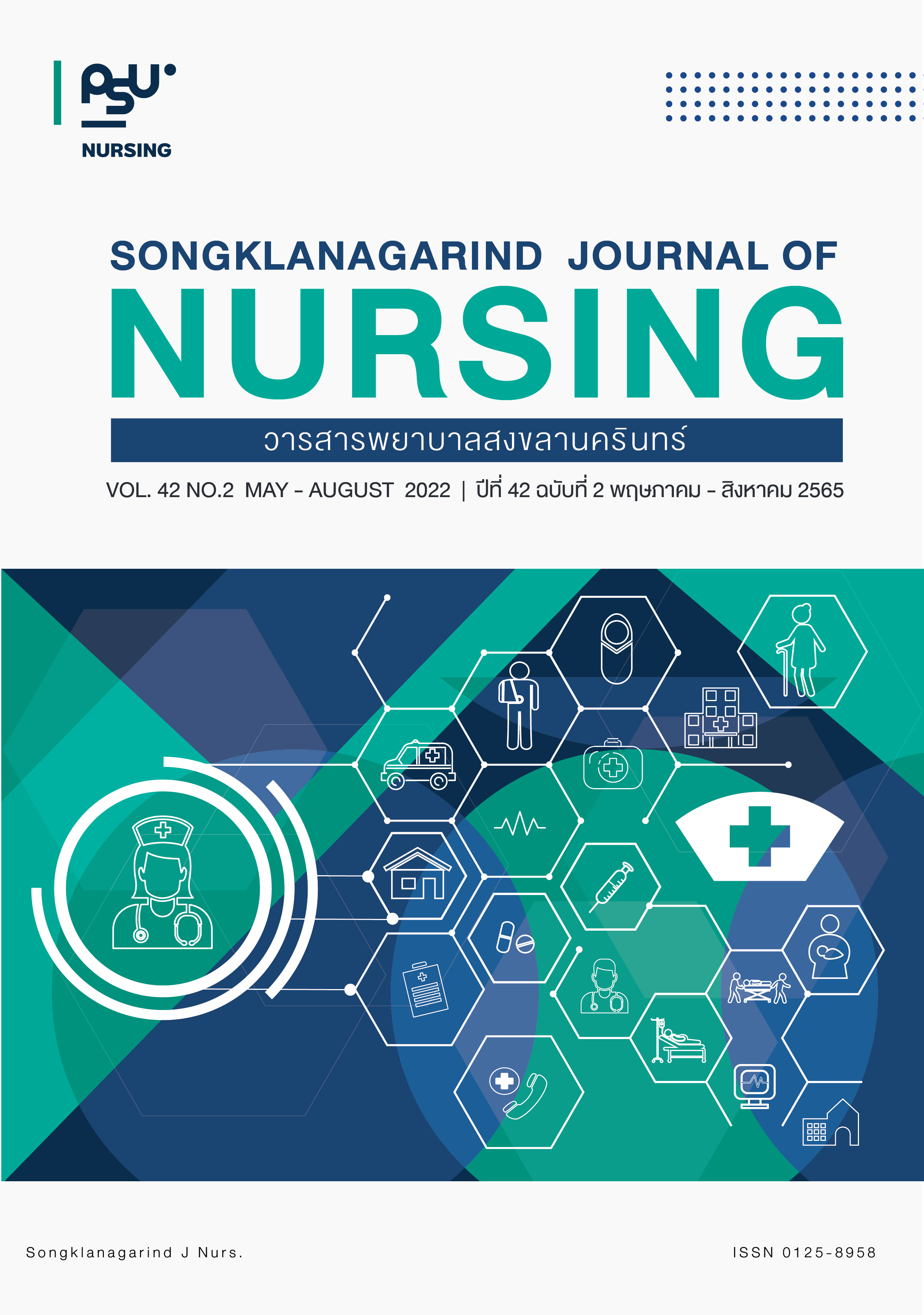Ethical Decision Making of Nurses Working in Emergency Department of Regional Hospitals, Southern Thailand
Main Article Content
Abstract
Objectives: To study the ethical decision-making of nurses in the situation at emergency department. Methods: This study is descriptive research. The sample was selected based on a purposive sampling. The inclusion criteria were set for recruitment of the sample composed of 136 nurses working in an emergency department for no less than one years. Data collection employed by Demographic data and Ethical decisionmaking of nurses in four situations. The ethical decision-making questionnaire was examined for content validity by three experts (CVI = .90) and the reliability percent of agreement was .87. The data were analyzed by using descriptive statistics. Results: The findings showed that 56.60% reported physicians to provide information about patients’ needs when patient refused treatment, 58.10% explained in a way patients could understand and confirming that patients had received their medication in the outpatient department when non-urgent patients want to receive emergency services, 76.50% involved coordinating with the health insurance department when patient needs urgent surgery, but there is no health insurance, 32.40% explained to the patients’ caregiver/relative that patients had died when do not resuscitate (DNR). Conclusion: The ethical decision making of samples were used the principle and concept of ethics; patient rights beneficence and truth telling.
Article Details

This work is licensed under a Creative Commons Attribution-NonCommercial-NoDerivatives 4.0 International License.
References
Hess EP, Grudzen CR, Thomson R, et al. Shared decisionmaking in the emergency department: Respecting patients’ autonomy when seconds count. Acad Emerg Med. 2015; 22(7): 856-64. doi: 10.1111/acem.12703.
McClelland M. Ethics: Harm in the emergency department-ethical drivers for change. OJIN. 2015; 20(2): 14. doi: 10.3912/OJIN.Vol20No02EthCol01.
Johnson KD, Winkelman C. The effect of emergency department crowding on patient outcomes: A literature review. Adv Emerg Nurs J. 2011; 33(1): 39-54. doi: 10.1097/TME.0b013e318207e86a.
Langeland K, Sørlie V. Ethical challenges in nursing emergency practice. J Clin Nurs. 2011; 20(13-14): 2064-70. doi: 10.1111/j.1365-2702.2010.03606.x.
Johnston A, Abraham L, Greenslade J, et al. Review article: Staff perception of the emergency department working environment: Integrative review of the literature. Emerg Med Australas. 2016; 28(1): 7-26. doi: 10.1111/1742-6723.12522.
Torabi M, Borhani F, Abbaszadeh A, et al. Barriers to ethical decision-making for pre-hospital care professionals. Journal of Nursing Ethics. 2020; 27(2): 407-18. doi: org/10.1177/0969733019848044.
Jimenez-Herrera MF, Axelesson C. Some ethical conflicts in emergency care. Nurs Ethics. 2015; 22(5): 548-60. doi: 10.1177/0969733014549880.
Dancour EE. Ethical issues in the ED. The Society for Academic Emergency Medicine (SAEM) [Internet]. 2021. [cited 2021 Feb 14]. Available from: http://www.saem.org/about-saem/academies-interest-groups-affiliates2/
Course Case Studies. Ethical decision making [Internet]. 2022 [cited 2022 May 6]. Available from: https://www.netce.com/casestudies.php?courseid=1939
Varkey B. Principles of clinical ethics and their application to practice. Med Princ Pract. 2021; 30: 17-28. doi: 10.1159/000509119.
Ogungbenro FA. Ethical considerations in emergency setting [Internet]. 2021 [cited 2022 May 6]. Available from: https://media.tghn.org/medialibrary/2021/07/2.Ethical_Considerations_in_the_ER.pdf
Rathachatranon W. Determining an Appropriate Sample Size for Social Science Research: The Myth of using Taro Yamane and Krejcie & Morgan Method. kupsrj. 2019; 6(1): 27-58. Thai.
Özlem M, Korhan EA, Çağatay ÜSTÜN C, et al. The Effect of ethics education programme on the nurses’ level of ethical decision making: A phenomenology study. International Journal of Medical Science and Clinical Invention. 2019; 6(5): 4474-80. doi: 10.18535/ijmsci/v6i5.09.
Rizala S, Baltaci N. Ethical decision-making levels of nurses and it’s affecting factors. Int J Caring Sci. 2020; 3(1): 42-52.
Blount CD. Influences on ethical decision-making by nurses employed in federal health care facilities [dissertation]. USA:
Walden University; 2020. 135 p.
Benjamin D. Pirotte BD, Benson S. Refuse of care [Internet]. 2021. [cited 2022 June 14]. Available from: https://www.
ncbi.nlm.nih.gov/books/NBK560886/
Ung-Praphan W. The World Medical Association Declaration on the rights of the patient [Internet]. 2008 [cited 2022 Apr 14]; 10: 922-4. Available from: https://www.doctor.or.th/clinic/detail/7166.
Toloo G-S, Aitken P, Crilly J, et al. Agreement between triage category and patient’s perception of priority in emergency departments. Scand J Trauma Resusc Emerg Med. 2016; 24(126): 2-8. doi: 10.1186/s13049-016-0316-2.
Comfort Nsiah C, Siakwa M, Ninnoni JP K. Registered Nurses’ description of patient advocacy in the clinical setting. 2019; 6(3): 1124-32. doi: https://doi.org/10.1002/nop2.307.
Sachdeva S, Jamshed N, Aggarwal P, et al. Perception of workplace violence in the emergency department. J Emerg Trauma Shock. 2019; 12(3): 179-84. doi: 10.4103/JETS.JETS_81_18.
Rubio-Navarro A, Garcia-Capilla D, Torralba-Madrid MJ, et al. Decision-making in an emergency department: A nursing accountability model. Nursing Ethics. 2019; 1-35. doi: https://doi.org/10.1177/0969733019851542.
Volpe N. Reversing the stop signs to proactive nursing care in DNR patients [master’s minor thesis]. USA: Rhode Island College; 2015. 37 p.
Spyros D, Mentzelopoulos SD, Anne‑Marie Slowther AM, et al. Ethical challenges in resuscitation. Intensive Care Med. 2018; 44: 703-16. doi: https://doi.org/10.1007/s00134-018-5202-0.
Zolkefli Y. The ethics of truth-telling in health-care settings. Malays J Med Sci. 2018; 25(3): 135-9. doi: 10.21315/mjms2018.25.3.14.
Davoodvand S, Abbaszadeh A, Ahmadi F. Patient advocacy from the clinical nurses’ viewpoint: A qualitative study. J Med Ethics Hist Med. 2016; 9(5): 1-8.
Oldland E, Botti M, Hutchinson AM, et al. framework of nurses’ responsibilities for quality healthcare Exploration of content validity. 2020; 27(2): 150-63. doi: https://doi.org/10.1016/j.colegn.2019.07.007.
Fallahi M, Mahdavikian S, Abdi A, et al. Nurses and physicians’ viewpoints about decision making of do not attempt resuscitation (DNAR). Multidiscip Respir Med. 2018; 13(20): 1-7. doi: http://doi.org/10.1186/s40248-018-0133-8.
Aacharya RP, Maharjan RK. Ethical analysis of medical futility in cardiopulmonary resuscitation. J Clinical Res Bioeth. 2014; 5(3): 182-5. doi: http://dx.doi.org/10.4172/2155-9627.1000182.


